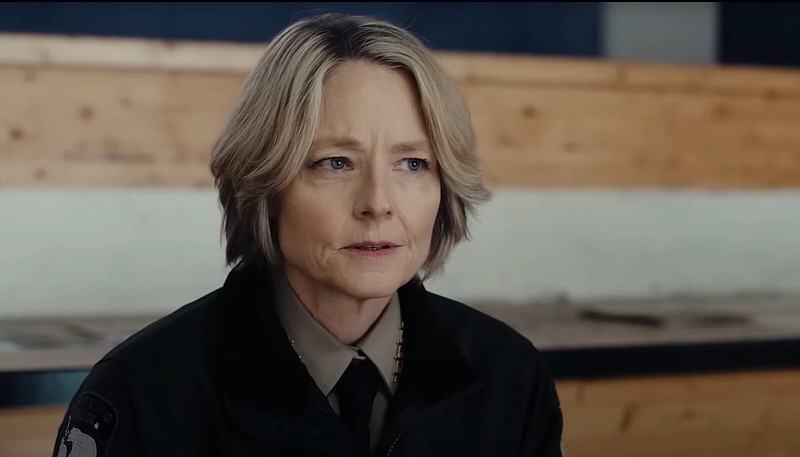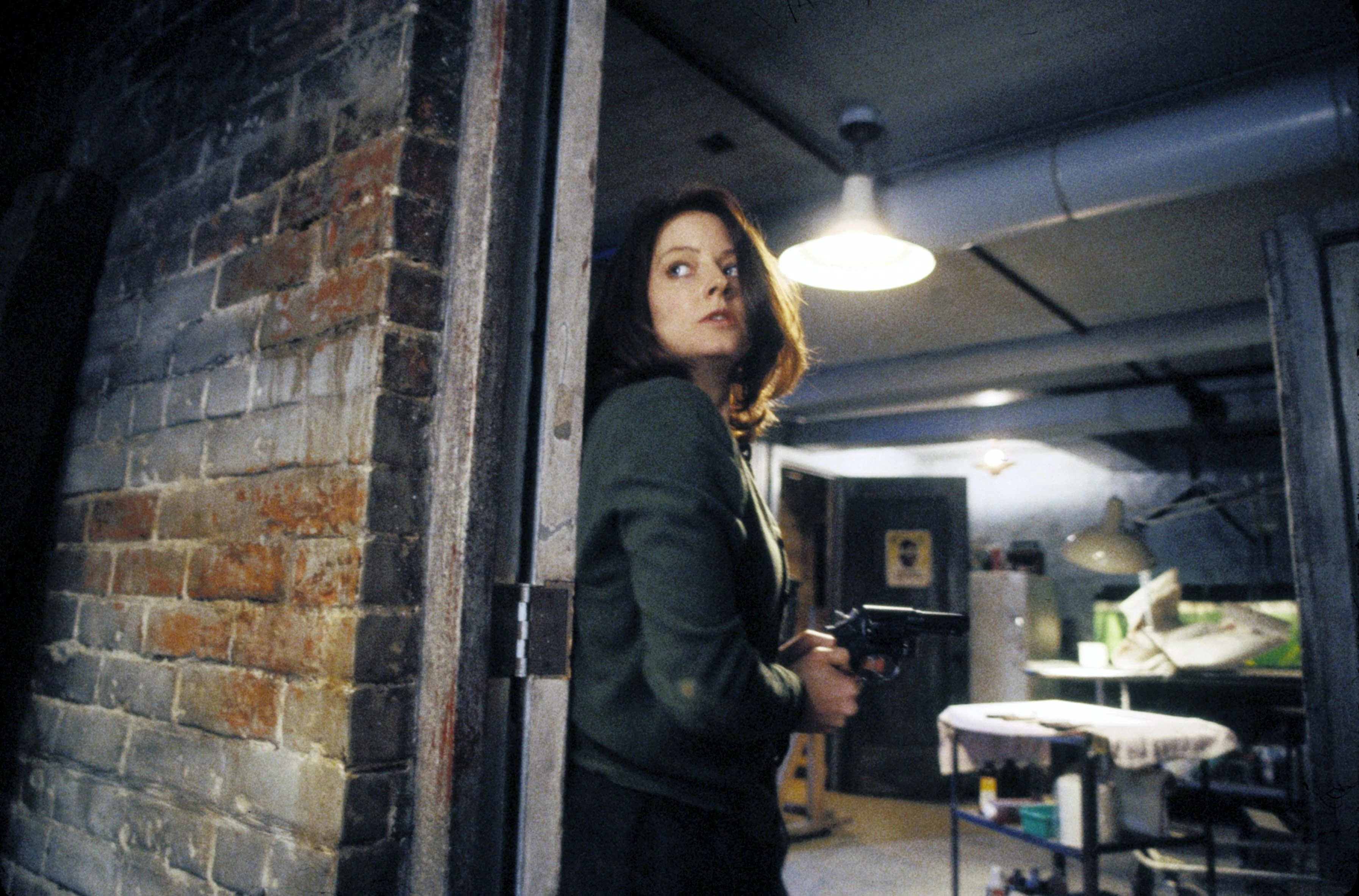Last month HBO released a trailer for the fourth season of anthological crime drama "True Detective." We can expect that, later this year, "True Detective: Night Country" will be available for streaming.
There had been some uncertainty about the series, the most recent season of which was set in Northwest Arkansas and was released way back in pre-covid 2019. Series creator Nic Pizzolatto -- who holds an MFA in creative writing from the University of Arkansas -- started working on a fourth season, but reportedly set the project aside after his contract with HBO ran out. (The material might appear in another form somewhere along the line; Pizzolatto's next project is writing a reboot -- or reset -- of Marvel Studios' "Blade" franchise, which is scheduled to begin filming later this month with "White Boy Rick" director Yann Demange guiding the production and "True Detective" alumnus Mahersala Ali in the starring role.)
So HBO -- or, I guess we should say Max now -- turned the series over to executive producer Barry Jenkins ("Moonlight") with Mexican auteur Issa López (2017's "Tigers Are Not Afraid") writing and directing the pilot episode.
They filmed the series (which is set in Alaska and reportedly revolves around the investigation of the disappearance of six men from a remote research station) in Iceland last fall. The cast includes John Hawkes, Christopher Eccleston, Fiona Shaw, Finn Bennett and Anna Lambe, with Kali Reis and Jodie Foster playing the investigators. (While credits aren't locked on the series, it's reasonable to think that Pizzolatto will be credited as an executive producer as well as the series creator.)
The trailer suggests that the tone of the series hasn't changed; it seems steeped in plausible horror and dread as reluctant partners Reis and Foster drill down into the deep secrets of the longest winter night. I'm looking forward to it.
But then, I'll watch anything with Jodie Foster.
While my fascination may not be as complete as John Hinckley's, I've yet to see her not be deeply interesting onscreen. Even in the earliest roles I remember -- as Johnny Whittaker's pal in the Disney outdoor adventure film "Napoleon and Samantha" (the 9-year-old Foster was mauled by a lion on the set; she still has scars and incurable ailurophobia -- fear of cats) and as a tomboyish Ripple-drinking street kid in Martin Scorsese's "Alice Doesn't Live Here Anymore," she projected an unnerving intelligence.
That's how it seems to me now, having closely followed her career since the double tap of 1976, when she followed up her turn as the child prostitute in "Taxi Driver" with a remarkable performance as gun moll Tallulah in the sublimely weird "Bugsy Malone." (Which lingers in the public imagination -- the film was referenced in last week's episode of "Succession.") Foster was 12 when she made those movies.
She always picked her spots -- as she got older she wasn't sure acting was a fit profession for a serious person, but she kept her hand in, and after a fallow period in the '80s (during which she graduated magna cum laude from Yale) emerged as a genuine force in "The Accused," a film she ironically thought might end her career. (She reportedly thought her performance was embarrassing yet ended up winning her first Best Actress Oscar.)
She ascended into full movie stardom with her iconic role as Clarice Starling in Jonathan Demme's "The Silence of the Lambs" (1991), in which she -- not yet 30 -- presented as a new kind of female screen hero, a tough proletariat who could go toe-to-toe with both genius psycho killers and patronizing bosses.
Because she's in the movies, we should start with her appearance: Pale blue eyes rimmed in violet (inexplicably rendered as brown on some promotional posters), a short upper lip curling and pouting, something to be chewed upon. Sexual tension meets The Serious American Actress, blankly pretty and fiercely competitive. She is not the only reason "The Silence of the Lambs" is a film worth seeing, but she is reason enough.
Demme introduces her to us as she works her way through an FBI training academy obstacle course, setting up the prime visual metaphor that will permeate this (when viewed from the bland perspective of the script) rather conventional crime drama.
This is the story of Clarice Starling's first assignment, her quest to find a bizarre serial killer known as Buffalo Bill before he strikes again. To do this she must enlist the aid of another multiple murderer, a mad psychologist quaintly named Hannibal "The Cannibal" Lecter, played with ferocious restraint by Anthony Hopkins. Lecter is imprisoned for life in a labyrinthine dungeon beneath a facility for the criminally insane.
Starling is chosen for the assignment precisely because she's a neophyte, and her boss -- played by reliably sinewy old pro Scott Glenn -- sends her into this mission blind. Presumably the less she knows about Dr. Lecter, the better.
Those encounters with Lecter are bloodless and as creepy-crawly as anything committed to film. Hopkins enjoys himself tremendously, but the real revelation is Foster. Watch her: Every flick of her eyes, every twitch and tremor is seamlessly integrated into her character. Nothing false or affected slips into her performance; we hardly notice her dead-on and no doubt researched-to-death Appalachian accent until Lecter picks it out.
This Starling is a climber, an overachiever and possibly a lesbian -- there is too much made of her apparent indifference to sex -- a straightforward and tough woman who is as transparent to us as she is to the trained mind of the mad scientist she interviews.
Rewatching the film, one is surprised how direct Demme's direction is. It's workmanlike and unobtrusive; he sets up his maze metaphor and touches on it now and again in the Quantico offices, the psychiatric facility and ultimately in the lair of Buffalo Bill. No film-school forced angles, no showy cutting; his close-ups of Lecter and Starling are efficient without being overbearing.
"The Silence of the Lambs" never lapses into artiness, never pauses to let us absorb its sense of style. Demme is directing like the Roger Corman disciple he is -- he even gives the great man a cameo as the director of the FBI.
Similarly, the Ted Tally script -- from the Thomas Harris book -- provides the characters with strong dialogue and moments of grim wit. While Lecter's demand to analyze Starling in exchange for his cryptic insights on the case seems a major contrivance, Hopkins' performance redeems Lecter's stock archness.
All his psychology is so much pop pap, and the movie takes the myths of psychoanalysis rather too seriously -- the "murder" of Miggs by Lecter is risible -- but all the mind murk is forgivable because it's not really important that we know why Buffalo Bill is killing women. It's enough to know that he is killing them, that he is one of those very modern monsters with some unquenchable need.
It is disappointing to discover the monster is a mincing homosexual with flowing blond locks and a yappy poodle named Precious, specially since we know most serial killers are straight men. Is Bill a homophobic characterization? Probably so, but he's not the prime evil. He's a damaged part, a chinked flywheel. His doctor could not make him better and may have made him worse.
While we have to consider the movie's flaws, what matters more is its undeniable power and precision. Despite being diluted by two run-of-the-mill sequels, "The Silence of the Lambs" is an authentic classic, the rare scary movie that allows its actors room to circle and brush lightly against one another, generating cool sparks. Hopkins, Glenn and especially Foster are terrific; the friction is gripping.
It brought her a second Oscar -- and maybe the luxury of not having to compete with her past triumphs. Her next two acting roles -- opposite Richard Gere in "Sommersby" and Mel Gibson and James Garner in "Maverick" -- positioned her as a somewhat more conventional Hollywood commodity in commercially viable films.
Though 1994's "Nell" was in theory a more daring role -- Foster played a woman who grew up with no human contact aside from the mother who kept her isolated in a Appalachian cabin -- it might fairly be described as Oscar bait.
It did earn her another nomination. I barely remember the film but can look up what I wrote: "Foster was merely adequate in a flashy part in a dismal movie. Still, she will probably win -- though Jessica Lange's Marilyn Monroe-wannabe in 'Blue Sky' was perhaps the most accomplished performance in this very weak field." And, in keeping with my dismal Oscar-picking record, I note that Lange did indeed win.
While I've not always been rewarded, I've always looked forward to Foster's projects -- I was one of the few who thought her bizarre 2011 Mel Gibson rescue attempt "The Beaver" was a good film. So I'm looking forward to the next "True Detective."
Email:
pmartin@adgnewsroom.com

